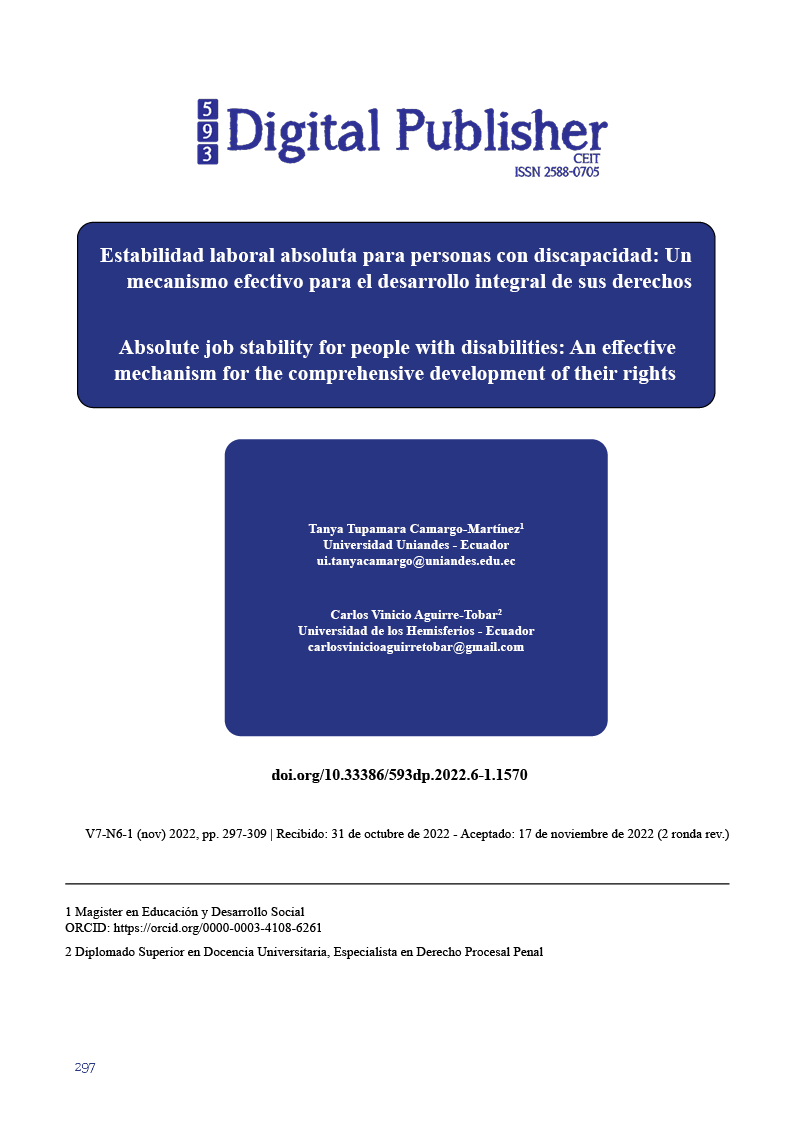Absolute job stability for people with disabilities: An effective mechanism for the comprehensive development of their rights
Main Article Content
Abstract
The objective of the investigation, the mechanisms of knowledge about our national legislation and comparative regulations regarding the right to job stability, of people with disabilities, were verified. A grounded theory method was applied for the analysis of the Constitutional Court judgments, regarding the right to job stability in Ecuador for people with disabilities, in order to verify whether it is fully complying with formal equality before the law and if there are no discrimination mechanisms between workers and servers with disabilities governed by the Organic Law of Public Service and workers of the Labor Code. It was concluded that the labor regulations in Ecuador violate formal equality before the law, due to the existence of regulations with different rights and obligations, which regulate the access, disciplinary regime and exit to work of the servers, a situation that is a substantial problem that constantly undermines rights.
Downloads
Article Details

This work is licensed under a Creative Commons Attribution-NonCommercial-ShareAlike 4.0 International License.
1. Derechos de autor
Las obras que se publican en 593 Digital Publisher CEIT están sujetas a los siguientes términos:
1.1. 593 Digital Publisher CEIT, conserva los derechos patrimoniales (copyright) de las obras publicadas, favorece y permite la reutilización de las mismas bajo la licencia Licencia Creative Commons 4.0 de Reconocimiento-NoComercial-CompartirIgual 4.0, por lo cual se pueden copiar, usar, difundir, transmitir y exponer públicamente, siempre que:
1.1.a. Se cite la autoría y fuente original de su publicación (revista, editorial, URL).
1.1.b. No se usen para fines comerciales u onerosos.
1.1.c. Se mencione la existencia y especificaciones de esta licencia de uso.
References
Anchundia, G., Cuenca, R., & Moreira, J. (2021). INTERVENCIÓN DEL TRABAJADOR SOCIAL EN LA INCLUSIÓN LABORAL PARA LAS PERSONAS EN SITUACIÓN DE DISCAPACIDAD. Revista Científica y Arbitrada de Ciencias Sociales y Trabajo Social “‘Tejedora,’” 4(8), 1–9.
Ayodeji, M. (2015). Protecting the Rights of Old People in Nigeria: Toward a Legal Reform. Journal of Law, Policy and Globalization, 40(2012), 131–143. https://www.kent.edu/sociology/resources/jaee/upload/obashoro.pdf
Babu, V. (2020). I nternational J ournal of M ultidisciplinary E ducational R esearch. In International Journal of Multidisciplinary Educational Research (Vol. 9, Issue 6).
Claudia, M., & Echeverría, M. (2019). Análisis de la estabilidad laboral reforzada en trabajadores no calificados. Revista DERECTUM, 5(1), 1–24.
Cristancho, J. (2019). EL DERECHO A LA ESTABILIDAD LABORAL DE PERSONAS CON DISCAPACIDAD EN COLOMBIA: LAS MUJERES DESVINCULADAS DEL “FONDO ROTATORIO DE LA POLICÍA NACIONAL. Revista de La Facultad de Derecho y Ciencias Políticas (Cusco), 4(11), 217–232. https://doi.org/10.51343/rfdcp.v4i11.153
Gómez, N., & Turizo, F. (2016). Seguridad y salud en el trabajo en Colombia: retos frente a las personas con discapacidad. Revista CES Derecho, 7(2), 1–11.
Marín, L. (2021). Aplicación de la estabilidad laboral reforzada a los docentes de cátedra en situación de discapacidad de las universidades públicas de Colombia. Revista Diálogos de Derechos y Política, 11(28), 179–207.
Munuera, P. (2015). Inclusión sociolaboral de las personas con discapacidad. Mediación laboral. REVESCO Revista de Estudios Cooperativos, 121(56), 7–32. https://doi.org/10.5209/rev
Valencia, L., & López, Y. (2021). Los trabajadores con discapacidad y su emancipación. Revista Polo Del Conocimiento, 6(9), 185–202. https://doi.org/10.23857/pc.v6i9.3018
Wahab, H. A., & Ayub, Z. A. (2016). Persons with disabilities act 2008: The economic promises for people with disabilities? International Journal of Economics and Financial Issues, 6(7Special Issue), 313–319.



